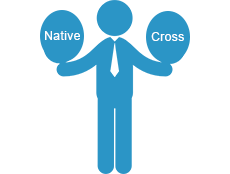Being a part of this digitized mobile world, we always seek what latest applications are coming soon or what else we can develop with the modernize techniques and platforms. Development of mobile apps using latest platforms is getting popular these days. There are many platforms available in the market, in which we can develop apps that can fit for all mobile devices.
When we think over this scenario we found that there are such impressive platforms, where we can develop various applications with a great source of technology. Here we will discuss about the mobile app development platforms such as Native and Cross platform, and will also put an opinion about the better pick for the developers.
It’s been years that developers are building native apps for Android and iOS; and they are stick with this platform, then why the need of cross platform raised? Why developers started using cross platform instead of native? Though we still believe that native platform development always a better way to go yet developers also prefer Cross platform as well. In this blog, we will discuss about native and cross platform that how these platforms impact on mobile development.
As each coin has two sides same with the given two; each of them has pros and cons that differentiate two of them with each other.
Native
When a developer wants to develop an app with a particular platform or device he(s) will go with Native as it is platform specific and it acquires the attributes of the operating system that is installed on the platform. Moreover, if you want to implement some specific hardware or software as per the latest technologies such as Camera, GPS and many more, you can easily do that as it has the capability of applying the latest technology. With Native platform, you can not only access all the hardware features exposed by the native code APIs but also you can have a great performance experience.
Pros
- Native language supportable
- Flexible
- Feasible for implementation and modification
- Rapid Development
- App store fully supported
- Full support for social app integration, like FB, twitter, G+, LinkedIn etc
- Optimization and QA testing can be done easily
- User-friendly Environment
Cons
- No auto update, always need to upgrade apps for the latest OS and features
- It takes more resources and time to develop app in multiple native platforms
- The functionality it offers is quite detailed thus a long time is required to develop the apps
- In this native code cannot be used on both Android and iPhone devices
- Objective C/Java needs to be learned for this development whereas more people are likely to know web languages that are less complicated
Cross Platform
What is Cross Platform? First, we need to know this; it is basically a single written code that can be used on multiple operating system or mobile platform. It permits the developers to use plug-in to make platform independent mobile apps. By using a single code on multiple platforms, developers can develop ample range of mobile applications. As Cross platform mobile app development tools are easy to use and there is no need to be skilled in highly complicated object oriented technologies like C++ and Java.
Pros
- Write once run anywhere
- Cost and Time effective
- Impressive look and feel
- Update once and sync all
- Decreases development cost
- Handy Development Services
- Use of Plug-ins
- Easy to Use
Cons
- Restriction for Updates
- Restrictive tools
- Slower and ineffective codes
- Loss of flexibility
- Not compatible with different platforms
- Different tools and languages used throughout, such as Xamarin, PhoneGap, Titanium, Grapple, Open plug, Corona, Unity etc
- Tough task to test on actual devices
Things that a Developer must keep in mind while choosing one:
There are some points that need to be consider while choosing a great platform for developing an app-
- Performance – Performance can be measured by the responsiveness, application speed and fluid user experience, such as how a user interact with the app without having any loading delay and how the app behave and response in return. Therefore, it is really necessary to have a well performed platform so that apps can be developed efficiently. A developer must keep in mind that application speed should be fast as the good speed can develop more satisfaction in user’s behavior. In this scenario Native is the real victor because it is more responsive, fast, fluid and seamless as per the user’ perspective.
- Development Time – The time, which is taken in the process of developing an app, is acknowledged as the “Development Time”. It is related to how many technologies are requisite to build it run on the preferred platforms. Therefore a developer need to understand that he(s) should choose the platform that is able to give an appropriate development time for the app development.
- Access to advanced device-specific features – There is always a need of advanced features that are required to add on the mobile apps, whether it’s a standard hardware such as a Camera or software such as GPS, multi-touch gestures and so on; Each developer wants to develop an app that is accessible for all the specific features so that at the end of the day user can have full of satisfaction.
- Ease of development – If your requirements are asking for a safe and an easy on the pocket way that comprises technologies such as HTML and JavaScript then Cross platform is the finest development platform for you, for example if you want to create a table with formless layout, then it can be more complicated with native technologies than would be in HTML whereas if you have enough time and money to develop the skills that are essential to build the native apps then native platform would be much better and more convenient.
- Money and Time Constraint – When we come at this point, Cross platform wins the race. On account of its quickest and cost effective solution, it fulfills the purpose. To the best of the knowledge, Native development cost is higher than the Cross platform and also it takes much time than that of Cross platform. Hence, Cross platform is a great pick here.
Conclusion
Well, we have already discussed so many aspects above related to Native and Cross platform. Though there are a lot of things to consider yet we tried to put some specific terms so that a developer can choose the appropriate Platform for the app development.
Here is one more thing that needs to be considered that when a developer creates an app’ architecture, he(s) should be aware of the complete requirements and expectations. Though it’s up to the given prerequisites and constraints yet it is a developer, who consider the best development platform for the desired app.
While doing all these things, there are some aspects, which should be kept in mind such as what requirements are putting by your clients and what your clients are expecting by your development. Since it’s a tough task to fulfill all the requirements yet it can be positively done if all the things are figured out previously.
All in all, a developer needs to think over all these aspects and then should go for the right one.




